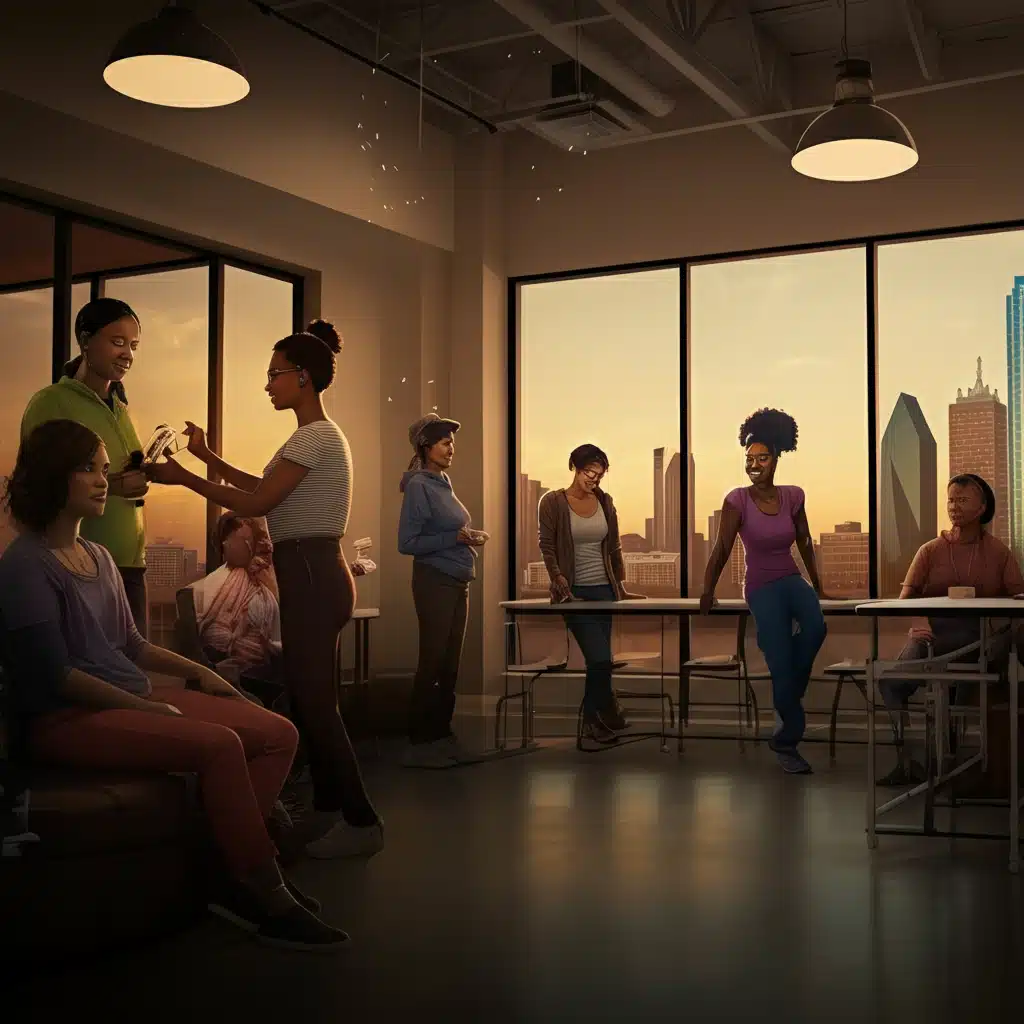For survivors of serious crimes or human trafficking, the path to recovery involves more than just healing from physical or emotional wounds—it involves securing a safe, stable future. In the Dallas-Fort Worth (DFW) metroplex, many individuals have taken the courageous step of assisting law enforcement and have been granted temporary status through a U Visa or T Visa. The next vital chapter in this journey is transitioning from that temporary status to becoming a lawful permanent resident (green card holder).
This process, known as Adjustment of Status (AOS), offers survivors the chance to permanently call North Texas home. This guide explains how U Visa and T Visa holders in DFW can navigate this complex legal landscape, highlighting eligibility requirements, the application process, and the local organizations dedicated to supporting survivors.
Understanding the Difference: U Visa vs. T Visa
While both visas are humanitarian protections for victims, they serve different purposes and have slightly different paths to a green card.
The U Visa (Victims of Criminal Activity)
The U Visa is designed for victims of certain qualifying crimes (such as domestic violence, sexual assault, or felonious assault) who have suffered mental or physical abuse and are helpful to law enforcement in the investigation or prosecution of the crime.
- Status: U Visa status is generally valid for four years.
- Path to Green Card: You become eligible to apply for a green card after three years of continuous physical presence in the U.S. while in U nonimmigrant status.
The T Visa (Victims of Human Trafficking)
The T Visa protects victims of severe forms of human trafficking (sex or labor trafficking) who comply with reasonable requests for assistance in the investigation or prosecution of trafficking acts.
- Status: T Visa status is also generally valid for four years.
- Path to Green Card: You become eligible to apply for a green card after three years of continuous physical presence in the U.S., or upon the conclusion of the trafficking investigation/prosecution, whichever is shorter.
Eligibility for Adjustment of Status
Transitioning to a green card is not automatic. You must meet specific criteria to prove you are ready for permanent residency.
For U Visa Holders
To adjust your status, you generally must meet the following requirements:
- Lawful Admission: You were lawfully admitted to the U.S. as a U-1 nonimmigrant.
- Continuous Presence: You have been physically present in the U.S. for a continuous period of at least three years since the date of admission as a U nonimmigrant.
- Good Moral Character: You have not refused to provide assistance to law enforcement since receiving your U visa.
- Admissibility: You are admissible to the U.S., or you have obtained a waiver for any grounds of inadmissibility.
- Humanitarian Grounds: Your continued presence is justified on humanitarian grounds, to ensure family unity, or is in the public interest.
For T Visa Holders
T Visa holders have a slightly more flexible path but must still prove:
- Lawful Admission: You were lawfully admitted to the U.S. as a T-1 nonimmigrant.
- Continuous Presence: You have been physically present in the U.S. for a continuous period of at least three years since admission, or a continuous period during the investigation or prosecution of the trafficking acts.
- Good Moral Character: You have maintained good moral character during your stay.
- Assistance: You have complied with any reasonable request for assistance in the investigation or prosecution of acts of trafficking (unless you are under 18 or unable to cooperate due to trauma).
- Hardship: You would suffer extreme hardship involving unusual and severe harm if you were removed from the United States.
The Application Process in DFW
Applying for AOS as a U or T Visa holder involves detailed paperwork and interactions with federal agencies. While the forms are processed at national service centers, your interactions—such as biometrics and potential interviews—will happen locally in Dallas or Fort Worth.
Step 1: Form I-485 (Application to Register Permanent Residence)
This is the primary application. You must file Form I-485 with U.S. Citizenship and Immigration Services (USCIS).
- Crucial Evidence: You must submit copies of your passport, your I-94 arrival/departure record, and approval notices for your U or T visa (Form I-797). You also need to provide a personal statement explaining why you deserve a green card as a matter of discretion.
Step 2: Medical Examination (Form I-693)
You must undergo a medical exam by a designated civil surgeon.
- Local Tip: You cannot go to just any doctor. You must use the USCIS “Find a Doctor” tool to locate an authorized physician in the DFW area—whether you live in Plano, Arlington, or downtown Dallas.
Step 3: Biometrics Appointment
After filing, you will receive an appointment notice for an Application Support Center (ASC).
- Locations: DFW has ASCs on North Stemmons Freeway in Dallas and on East Loop 820 in Fort Worth. You will provide fingerprints, a photo, and a signature.
Step 4: The Interview (Maybe)
While many employment-based applicants face interviews, U and T Visa adjustment cases are often decided without an interview if the application package is strong and complete. However, if USCIS has questions about your eligibility or criminal history, they may schedule an interview at the Irving or Dallas Field Office.
Specific Considerations for DFW Residents
Safety and Confidentiality:
Because U and T visas are based on sensitive victimization, USCIS has strict confidentiality rules (VAWA confidentiality). However, when you attend local appointments in DFW, ensure you are in a safe environment. If you have moved to escape an abuser or trafficker, updating your address with USCIS is mandatory but must be done carefully to ensure mail doesn’t go to an unsafe location.
Public Charge Exemptions:
Unlike family-based or employment-based applicants, U and T Visa holders adjusting status are generally exempt from the public charge rule. This means accessing certain public benefits in DFW (like housing assistance or food stamps) typically will not negatively impact your green card application.
Legal Complexity:
Proving “continuous physical presence” can be tricky if you have traveled briefly outside the U.S. or if you have gaps in your documentation. Furthermore, proving “good moral character” can be complicated if you have had any interactions with law enforcement, even minor traffic issues in the metroplex. Consulting an experienced Adjustment of Status Attorney is highly recommended to review your history before you file.
Free and Low-Cost Local Resources in DFW
The Dallas-Fort Worth community has a robust network of organizations dedicated to helping survivors of crime and trafficking. These groups provide everything from counseling to legal aid.
- Mosaic Family Services: Based in Dallas, Mosaic is a haven for survivors of human rights abuses, including domestic violence and human trafficking. They offer comprehensive case management, shelter, and legal services.
- Human Rights Initiative of North Texas (HRI): HRI provides free legal representation to immigrants who have suffered human rights abuses. Their team is deeply experienced with U and T Visa cases and the subsequent adjustment process.
- Traffick911: This organization focuses on freeing youth from sex trafficking in North Texas. They work closely with law enforcement and can be a vital resource for younger T Visa holders.
- Genesis Women’s Shelter & Support: Serving the Dallas area, Genesis provides shelter, safety, and counseling for women and children escaping domestic violence. Their services often intersect with the needs of U Visa applicants.
- Catholic Charities Dallas – Immigration Legal Services: They offer low-cost legal consultations and representation for victims of crime and trafficking, helping navigate the long road from visa approval to green card.
Securing Your Future
Obtaining a U or T Visa was a significant milestone, acknowledging your survival and your cooperation with justice. Adjusting your status to permanent residency is the final step in reclaiming your autonomy. It grants you the freedom to work where you choose, travel with greater ease, and live without the fear of your status expiring.
The paperwork can be daunting, and reliving your history for an application can be emotionally taxing. But you do not have to do it alone. By utilizing the skilled legal professionals and compassionate support organizations available right here in Dallas-Fort Worth, you can move forward with confidence toward the stability and peace you deserve.






